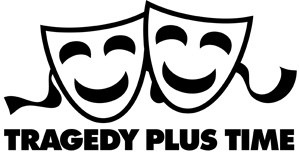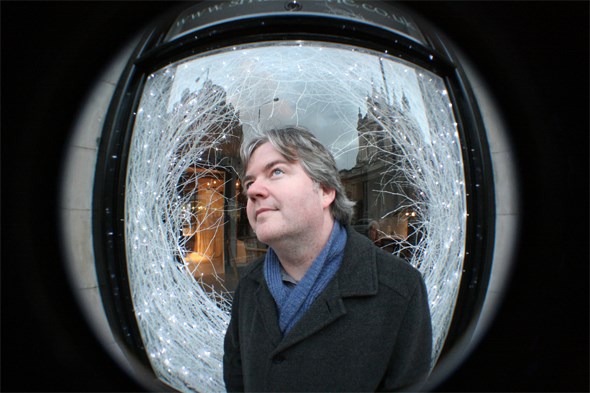 |
“Comedy is tragedy plus time.” |
Finally, for those out there that don’t like to laugh, they might be best served by a quote from another lady of show business, Julia Roberts:
“Show me a person who doesn't like to laugh and I'll show you a person with a toe tag.”
Since I began in comedy many comedians I have talked to told me that if you want to work in the arts in Canada, you had better be comfortable wearing different hats. Well, no one ever used the hats analogy; no one actually uses that phrase.
If you wanted to save yourself some typing, you could find a great example of this Canadian comedic versatility by typing in “Ian Boothby”.
At 14, Boothby became the youngest union writer for television in Canada. Since that time he has written for numerous television projects, performed as a stand comedian, been a founding member of the award winning sketch troupe “Canadian Content” (that had a run in London), performed regularly with the long running Urban Improv, and created, co-wrote and starred in the 11th Hour for CBC television.
This shortened list would be enough to make my point.
Of course, this list stops just short of an accomplishment I find astonishing. He writes comics. He is paid to write comics. Ian Boothby writes for The Simpsons and Futurama comic books. He has won an Eisner award for this. Matt Groening knows who he is.
For a person like myself who gets giddy whenever the Simpsons make a reference about Canada, actually meeting someone who has worked for the man himself is a thrill.
Ian’s comic book position has allowed him to travel the world over, often with his wonderful wife, the very talented comic artist Pia Guerra.
Lucky for us in Vancouver, they always return.
Ian Boothby serves as an example to those in the Vancouver comedy community that with some talent, flexibility and perseverance, you just might be able to carve out a successful career and frustrate people when it takes a little more time to answer the question “What do you do for a living?”
If you want to know more you can go to : http://www.canadiancontentsketch.ca/ or
Ian took a brief break between projects to answer some questions for Vancouver Is Awesome.
When was the last time you laughed until you cried?
In the car on a long drive with my wife Pia Guerra and sister in law Vicky Van. Both are very funny people and the conversation gets dark and dumb which is a good combo. Cool ironic comedy has nothing over a stupid joke in a traffic jam. Paul F. Tompkins’ peanut brittle routine always gets me too.
What are the differences in the feeling of reward you get from on-stage work versus the written work you do?
One’s instant, one’s delayed. I’ve done talks in other countries where you do a joke and it has to be translated. So you tell it, there’s a small laugh from the few people who speak English and then you’ve got to wait until the person finishes telling it to see how it goes over. It feels like forever. Writing comedy is like that, you wait six months to a year and hope it gets translated well.
The downside with live comedy is when it’s over you usually don’t have any record it ever happened. With writing it’s nice to have something on DVD or a bookshelf that you did a few years ago.
I think it’s good for writers to do some live performing. A lot of our job is pitching ideas in a room or by email and having people assume what might be funny or not and give their approval. It’s nice to get that instant feedback from a crowd.
You’ve performed comedy in America, Canada and the United Kingdom. What are the advantages of the audiences in each?
They all have their own defenses up that you have to get past. In the UK they’ll think you’re an American and you have to get past that. In America they’re very open to something new but if you’re doing what they’ve seen before they tune out. In Canada you can’t have any pretension. You can be cocky and confident but not a snob.
Doing comedy in Canada is more heavy lifting because not a lot of people go to live shows regularly and you have to introduce them to the idea. In London England it’s something people actually do regularly, they go to comedy shows and know how they work. In Canada it feels like we always have to start things off by explaining what’s going to happen. You don’t get that with opera. “Okay people are going to be singing, turn off your phones and please don’t yell out what you think Seigfried should do with the magic ring!”
What is one myth about improv comedy you’d like to dispel?
All the myths are true. It can be very hack or fresh and it all depends on whose is performing that night. Like stand up, even the stuff that’s considered alternative starts to develop its own hack stereotypes.
The people I work with don’t plan anything in advance. Some improvisers do but I don’t see any advantage in trying to jam your already written sketch into an improv scene. Unless you’re The Second City.
Why is Vancouver a good place for comedy?
Comedy in Vancouver is like sushi, the quality for the price is amazing. For $5 a night you could see amazing show all week long. But like sushi if you aren’t already on board with the idea it’s hard to know where to go or what you’ll be getting. It’s never really clear what the shows will be or what level of performers you’ll be getting to the average person looking for something to do that night.
Who is one performer/group of performers you think everyone should see at least once?
Maria Bamford and Paul F. Tompkins. You asked for one and that is two but imagine if they combined? What wonders would unfold!
Every article about comedy has to have a pun in the title. What would you like yours to be?
Comedy is Serious Buzzness. Then make sure you spell my name Ian BoothBEE and have a picture of a bee nearby. And underline BEE. Wait I may have stolen that from Samantha Bee. Let me get back to you.
What advice would you give a person/sketch troupe who is just starting out in comedy?
It’s not a contest between you and the other performers (except for those times where there’s a contest). When you’re starting out you can get trapped comparing your progress with your peers and if you see them doing better than you getting upset. But your main focus can’t be success at the start (or really at any point) it has to be getting better and burning up more stage time. If you’re not getting that time from others then start your own nights (but make it clear on your posters this is an amateur show).
You’re going to bring a lot of stuff to the stage you’ll be embarrassed about later. There’s no way around that. The other performers aren’t your competition. If they get better it makes the shows better and the scene better. If you’re doing something good there will always be an audience for it.
Anyone who tells you there’s only one way to do something might mean well but take it with a grain of salt. Stand Up, Improv and Sketch Comedy in the forms we know there are all still very young art forms and there’s a lot of undiscovered country.
Maria Bamford has a routine where she’s talking to a friend about stand up and they say what they’d do is make it big like Seinfeld and then just coast. There is no coasting. There is no end to this. In my comic book writing job my boss is Matt Groening. I have good friends who’ve won Oscars. My wife has won every comic book art award there is. None of them coast. Things can get better financially but you’re still doing the work and it’s still a job. If you treat your career in comedy with the same mindset as winning the lotto, you’re in for a rough ride.
You’ll need to work with people in whatever you do and most people don’t want to work with jerks no matter how talented you are.
What is a comedic premise you think needs to be retired?
Anything is fine as long as there’s a fresh take on it. But rape seems to be a new way to spice up the act without much personal risk to the comedian. Any premise that’s shock for shock’s sake or worse fake shock, “That’s right I’m not afraid to make fun of midgets”, is pretty weak tea as they say. And by they I mean sissies.



